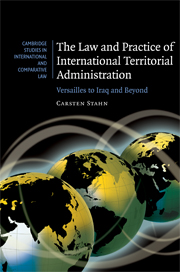Book contents
- Frontmatter
- Contents
- Foreword
- Preface
- Selected table of cases
- List of abbreviations
- Table of engagements
- Introduction
- Part I The historical and social context of international territorial administration
- Part II The practice of international territorial administration: a retrospective
- Part III The foundations of international territorial administration
- Part IV A typology of legal problems arising within the context of international territorial administration
- Introduction
- 13 The legal status of the administered territory
- 14 The status of international administering authorities
- 15 The exercise of regulatory authority within the framework of international administrations
- 16 The relationship with domestic actors
- Part V International territorial administration at the verge of the twenty-first century: achievements, challenges and lessons learned
- Bibliography
- Index
- CAMBRIDGE STUDIES IN INTERNATIONAL AND COMPARATIVE LAW
13 - The legal status of the administered territory
Published online by Cambridge University Press: 19 January 2010
- Frontmatter
- Contents
- Foreword
- Preface
- Selected table of cases
- List of abbreviations
- Table of engagements
- Introduction
- Part I The historical and social context of international territorial administration
- Part II The practice of international territorial administration: a retrospective
- Part III The foundations of international territorial administration
- Part IV A typology of legal problems arising within the context of international territorial administration
- Introduction
- 13 The legal status of the administered territory
- 14 The status of international administering authorities
- 15 The exercise of regulatory authority within the framework of international administrations
- 16 The relationship with domestic actors
- Part V International territorial administration at the verge of the twenty-first century: achievements, challenges and lessons learned
- Bibliography
- Index
- CAMBRIDGE STUDIES IN INTERNATIONAL AND COMPARATIVE LAW
Summary
The international administration of territories raises different legal questions related to the status of the administered territory. The establishment of an international administration may affect the status of the administered territory itself. Moreover, the assumption of territorial authority by an international administration may have an impact on relations between the administered territory and other entities.
Status concepts
Territories under international administration do not fit easily within traditional status models. There is often dissociation between sovereignty and government. International administrations typically assume powers of government and administration over the administered territory without acquiring ownership or title over the territory. This distinguishes international administration from territorial sovereignty. The scope of authority assumed by international administrations varies from case to case. It may range from mere coordination and assistance in specific sectors of public authority, to the exercise of exclusive jurisdiction.
Notions developed in legal doctrine
Legal scholars recognised quite early on that the phenomenon of international territorial administration raises status questions which require further specification. International territorial administration has, in particular, been rightly distinguished from historical models of foreign administration within the framework of protectorates and condominia, and from administration within the framework of the Mandate and the Trusteeship Systems. However, most of the alternative classifications developed in legal doctrine suffer from conceptual problems. Some of them are too narrow, because they have been developed in response to very specific types of administration. Others are impractical, because they are too vague and imprecise in scope.
- Type
- Chapter
- Information
- The Law and Practice of International Territorial AdministrationVersailles to Iraq and Beyond, pp. 535 - 578Publisher: Cambridge University PressPrint publication year: 2008



